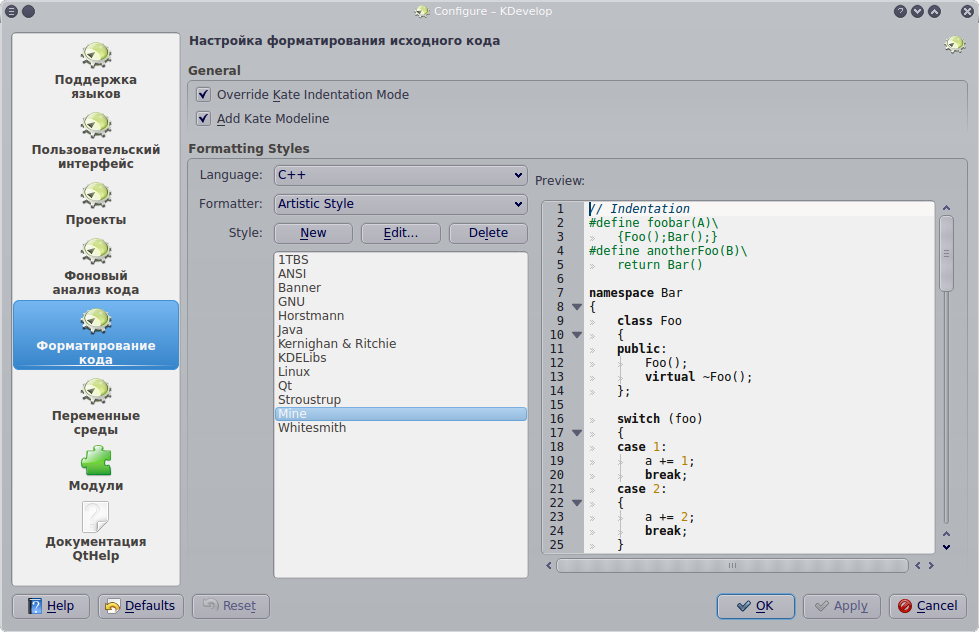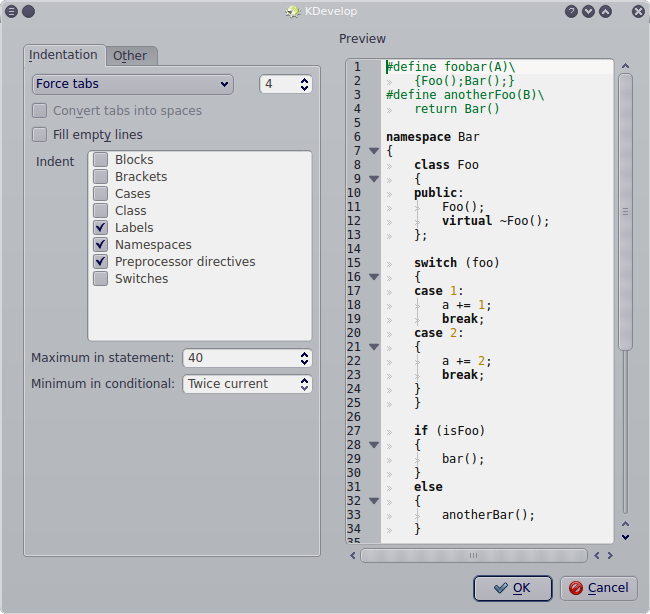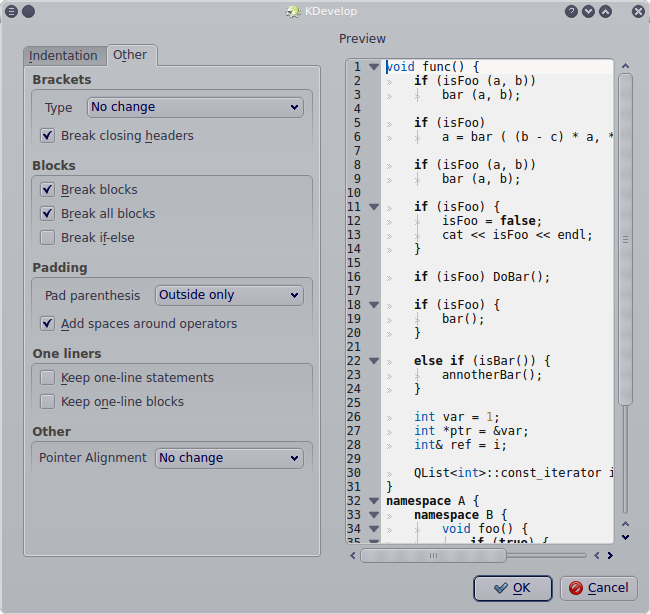Naming conventions
- Local variables are named in
camelCasewith lower first letter. - Member variables are named in
CamelCase_with upper first letter and an underscore in the end (stupid, I know, but that’s the tradition). - Enums are named in
CamelCasein singular form with upper first letter. - Enum members are named in
CamelCase. Enum members are always used with corresponding enum scope qualifier (see C++11 scoped enums). - Global variables aren’t named at all. They shouldn’t exist in your code.
- Try to make variables visually distinct from each other. Having
index1andindexlnear each other isn’t a good idea. - Member functions that aren’t invokable (aren’t Qt signals nor slots) are named in
CamelCasewith upper first letter. - Invokable member functions (Qt signals and slots) are named in
camelCasewith lower first letter. - Global free functions are also named in
CamelCasewith upper first letter. - Local free functions are named in
CamelCasewith upper first letter. If possible, they should be in their own anonymous namespace. - File name should be like the class’s name all in lower case.
- There are generally two files per class: header file and source (implementation) file.
#include order
- If it’s implementation file, the corresponding header file.
- Standard C++/STL headers like
iostreamorfunctional. Prefer C++ headers (say,cmath) over C-style ones (math.h). - Boost headers.
- Qt headers.
- Any other library headers.
- LeechCraft headers.
- Your own files.
Variable declarations, function declarations and general things
Initialize each variable when declaring it, even if it’s going to be assigned few lines later anyway.
Declare each variable on a separate line.
Attach star to the variable name (the only exception is return type declaration in function declaration/definition):
void* f (int *a) { int *b = 0; int *c = *a; return b; }& meaning reference is attached to the type:
void g (const T& t, U& u);Types should be mentioned with full namespace in the signals/slots declarations and
QObject::connect()calls sincemocdoesn’t parse them well otherwise.Never, never ever put
using-declarations in your headers.Put your code in
LeechCraft::YourPluginnamespace.Put your implementation code in
.cpp-file inLeechCraft::YourPluginnamespace as well or prefix each function. Avoidusing-directives sincelupdatetool doesn’t handle them and you’ll end up with untranslated strings.All the private variables and definitions like
Q_OBJECTorQ_INTERFACESfollows immediately after beginning of the class definition.Don’t put variable names in function declarations unless you plan to
doxygenit.Braces are always on new line and are the only character there.
Identation and line breaks
Use tabs to ident code. Set your tab width to 4 spaces, and in case of vim:
:set shiftwidth=4 :set softtabstop=4 :set tabstop=4Breaking inside function parameter list adds two tab levels.
int func (int a, int b, int c);Breaking an incomplete expression adds a tab level. Breaking inside each parenthesis pair adds one more tab level. Binary operators are in the end of the line, the
->operator also stays on the same line, only the.(dot) operator goes to the next line.It is OK to make long lines in case you break them at about 72 column.
Whitespaces
Unary operators are glued to their operands.
++a;Binary operators are surrounded by whitespaces from both sides.
c = a + b; ++a && !c;Parenthesis are surrounded by whitespaces only from the outer side and only if the other symbol isn’t a brace.
((a && b) || (c + !d) && e)The only exception from the previous rule is the case when parenthesis are followed by a
.or->operator or semicolon.int a = f (); a = f () + g (); a += GetPointer ()->h (); a -= GetReference ().DoStuff ();
Examples
So, an example header file would be like:
#pragma once
#include
namespace LeechCraft
{
struct Entity;
namespace YourCode
{
class SomeClass : public QObject
{
Q_OBJECT
public:
SomeClass (QObject* = 0);
int Get42 () const;
public slots:
void handle42Changed (int);
signals:
void gotEntity (const LeechCraft::Entity&);
}
}
}
The corresponding source file would be:
#include "someclass.h"
#include
#include
#include
#include
#include
#include "core.h"
namespace LeechCraft
{
namespace YourCode
{
namespace
{
int func (int a, MyClass *f)
{
int result = f->GetID () +
SomeAnotherLongFunctionYouWillDefinitelyWantToWrap (a);
result *= Core::Instance ().GetSomeCalculator ()->
Initialize ().GetFactor ();
result /= Core::Instance ()
.AnotherReaaaallyLongFunction (result, a);
if ((result == 42 &&
!a) ||
a == 42)
std::cout << "Truth is out there" << std::endl;
return result;
}
}
SomeClass::SomeClass (QObject *parent)
: QObject (parent)
{
}
int SomeClass::Get42 ()
{
return 42;
}
void SomeClass::handle42Changed (int newNum)
{
if (newNum != 42)
throw std::runtime_error ("WTF? 42 isn't 42!");
emit gotEntity (Entity ());
}
}
}Language
- Use STL, it’s cool.
- Use Boost, it’s cool.
- Use exceptions, they’re cool.
- Don’t reinvent the wheel, it’s not cool.
- Don’t use preprocessor for anything other than include guards and Boost.PP black magic.
- Prefer
#pragma onceover include guards. - Prefer C++11 lambdas over free functors/functions.
- Prefer
qobject_castoverdynamic_cast. - Prefer forward declarations to reduce compile time.
- Pass objects by const reference wherever possible. That would speed up things and may reduce compile time since there would be more candidates for forward declaration.
- Put member functions implementations in
.cpp-file to reduce compile time. - Use
std::shared_ptr. Except the obvious memory bookkeeping reason, one more is thatshared_ptrallows the corresponding type to be known only on instantiation which usually happens in source file. This way you get one more chance to forward-declare the type in the header, further reducing compile time. - Use
std::unique_ptr. - Consider Pimpl idiom. It can speed compilation a lot.
- Forget about
mallocandfree. Usenewanddeleteinstead. - Resource acquisition is initialization, don’t forget about it. You can once again use
std::shared_ptrorstd::unique_ptrwith a custom deleter to call an arbitrary function when control gets out of scope, be it a database disconnect, call toQSettings::endGroup()afterbeginGroup()or whatever.
Example IDE settings
KDevelop is the IDE of choice for LeechCraft. It’s a sophisticated IDE, supporting CMake projects, having awesome autocomplete features that can even handle Boost-rich code, and KDevelop 4.3 would also support features like lambdas, autos and variadic templates from C++11 when released.
The following settings make autoformatting the most close the LC’s codestyle.
First, we make a custom codestyle in KDevelop’s settings:  Please note the Add Kate Modeline checkbox on this screenshot.
Please note the Add Kate Modeline checkbox on this screenshot.
The custom style’s settings should be something like this: 

